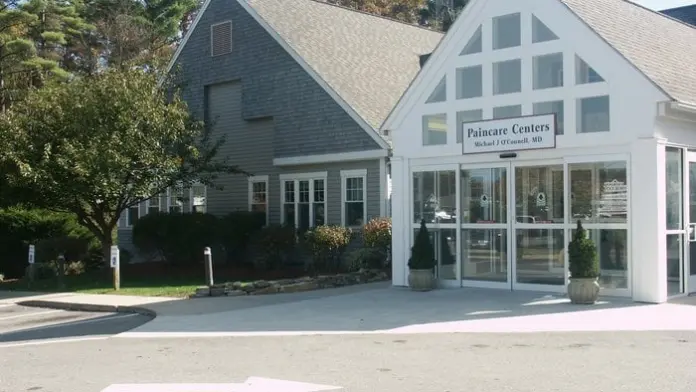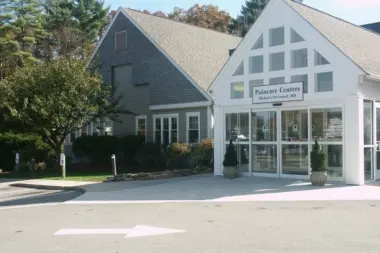I’ve called over 100x in a 14 day span and cannot leave a message nobody answers the phone can’t get a link for my appointment and if I do im told their understaffed this is unacceptable if you can I would find another drug dealer
About ROAD To A Better Life
ROAD to a Better Life is in a secluded part of Somersworth, New Hampshire. It’s an outpatient addiction treatment facility. They provide therapy and treatment for both drug and alcohol addiction. The services available include medication assisted treatment (MAT) and behavioral health services such as individual and group therapy.
Buprenorphine and Naltrexone for Opioid Use Disorder
In the medication assisted treatment program, the two medications you’ll have the option of receiving are buprenorphine and naltrexone. Buprenorphine works behind the effects of other opioids and relieves you of your withdrawal symptoms. Stabilization can be achieved anywhere between a few days or a week.
Naltrexone is equally effective and can be administered either through a pill or an injection. If you opt for the injection, you’ll only need to have it administered once a month. The medical team will help you decide which medication and dosage is best for your needs.
Safe Treatment for Pregnant Women
The facility has a special program designed for pregnant women who need assistance with substance use disorder. The staff will work with you to make sure you have a safe birthing experience. You’ll also be provided buprenorphine therapy to reduce your cravings.
You’ll be seen weekly by your clinicians for the first four to six weeks, then every two weeks for the remainder of your pregnancy. The program will collaborate with OB departments and local hospitals to make sure you’re getting a continuity of care throughout labor and delivery.
Healing in Nature
Somersworth has various nature areas you can use as a means of relieving your stress so you don’t resort to using substances. A few areas you might like to visit include the Somersworth Riverwalk or the Mast Point Dam Recreation Area. Willand Pond is also right off the Spaulding Turnpike.
Latest Reviews
Rehab Score
Gallery


Accepted Insurance
Other Forms of Payment
Private insurance refers to any kind of healthcare coverage that isn't from the state or federal government. This includes individual and family plans offered by an employer or purchased from the Insurance Marketplace. Every plan will have different requirements and out of pocket costs so be sure to get the full details before you start treatment.
Self-pay involves paying for treatment out of your own pocket. You can use savings or credit, get a personal loan, or receive help from family and friends to fund your treatment. If you don't have insurance or your insurance plan doesn't cover a specific program, self-pay can help ensure you still get the care you need.
Medicare is a federal program that provides health insurance for those 65 and older. It also serves people under 65 with chronic and disabling health challenges. To use Medicare for addiction treatment you need to find a program that accepts Medicare and is in network with your plan. Out of pocket costs and preauthorization requirements vary, so always check with your provider.
Medicaid is a state based program that helps lower-income individuals and families pay for healthcare. Medicaid covers addiction treatment so those enrolled can use their coverage to pay for rehab. When a program accepts Medicaid the client often pays very little or nothing out of their own pocket.
Military members, veterans, and eligible dependents have access to specific insurance programs that help them get the care they need. TRICARE and VA insurance can help you access low cost or no cost addiction and mental health treatment. Programs that accept military insurance often have targeted treatment focused on the unique challenges military members, veterans, and their families face.
Financial aid can take many forms. Centers may have grants or scholarships available to clients who meet eligibility requirements. Programs that receive SAMHSA grants may have financial aid available for those who need treatment as well. Grants and scholarships can help you pai for treatment without having to repay.
Addiction Treatments
Levels of Care
Clients undergoing treatment at an outpatient rehab reside in their own homes and engage in counseling and recovery education sessions in the evening, at night, or on the weekend. This ensures clients' access to care while working, caregiving, or attending school. Outpatient treatment is often the next level of care for clients stepping down from inpatient care, though some clients enroll immediately after completing detox. Many programs offer medication assisted treatment (MAT) for those in alcohol or opioid recovery.
ROAD to a Better Life's Intensive Outpatient Program (IOP) is designed to meet the needs of individuals who suffer from a substance use disorder and need more than weekly counseling, but do not need residential treatment. The program provides therapy and monitoring in a comfortable, supportive group setting.
Rehab aftercare programs provide continuing care for clients in an advanced phase of recovery, including those who have completed detox and intensive inpatient treatment. These clients typically have already engaged in many hours of addiction counseling and recovery education. Drug rehab aftercare supports clients in maintaining their sobriety at home, in the workplace, and in the community. Case managers and care teams advise clients on the resources they may need to promote their sustained sobriety.
12-step programs are addiction recovery models based on Alcoholics Anonymous (AA). A number of substance abuse programs (including some drug and alcohol rehab centers) use the 12 steps as a basis for treatment. Beginning steps involve admitting powerlessness over the addiction and creating a spiritual basis for recovery. Middle steps including making direct amends to those who've been hurt by the addiction, and the final step is to assist others in addiction recovery in the same way. 12-Step offshoots including Narcotics Anonymous (NA), Cocaine Anonymous (CA), Dual Recovery Anonymous (DRA), Sex and Love Addicts Anonymous (SLAA) and Gamblers Anonymous (GA).
The ROAD Program is the main recovery program that offers a combination of Medication Assisted Treatment (MAT) with behavioral health services. The facility adheres to the abstinence model, meaning that drug or alcohol use while enrolled in the program is prohibited. ROAD Program uses a unique combination of MAT and Behavioral Health services that the facility believes is the recipe for recovery. In the ROAD program you MUST be involved in both MAT and Behavioral Health services, ROAD do not offer a program with just MAT.
Treatments
The goal of treatment for alcoholism is abstinence. Those with poor social support, poor motivation, or psychiatric disorders tend to relapse within a few years of treatment. For these people, success is measured by longer periods of abstinence, reduced use of alcohol, better health, and improved social functioning. Recovery and Maintenance are usually based on 12 step programs and AA meetings.
Treatment provided at drug rehab in New Hampshire prepares individuals to handle life stressors without using substances. Participants get the tools and support they need to maintain lifelong recovery.
A combined mental health and substance abuse rehab has the staff and resources available to handle individuals with both mental health and substance abuse issues. It can be challenging to determine where a specific symptom stems from (a mental health issue or an issue related to substance abuse), so mental health and substance abuse professionals are helpful in detangling symptoms and keeping treatment on track.
Opioid rehabs specialize in supporting those recovering from opioid addiction. They treat those suffering from addiction to illegal opioids like heroin, as well as prescription drugs like oxycodone. These centers typically combine both physical as well as mental and emotional support to help stop addiction. Physical support often includes medical detox and subsequent medical support (including medication), and mental support includes in-depth therapy to address the underlying causes of addiction.
Programs
Adult rehab programs include therapies tailored to each client's specific needs, goals, and recovery progress. They are tailored to the specific challenges adult clients may face, including family and work pressures and commitments. From inpatient and residential treatment to various levels of outpatient services, there are many options available. Some facilities also help adults work through co-occurring conditions, like anxiety, that can accompany addiction.
Young adulthood can be an exciting, yet difficult, time of transition. Individuals in their late teens to mid-20s face unique stressors related to school, jobs, families, and social circles, which can lead to a rise in substance use. Rehab centers with dedicated young adult programs will include activities and amenities that cater to this age group, with an emphasis on specialized counseling, peer socialization, and ongoing aftercare.
The postpartum period is a sensitive time, especially for women in addiction recovery. Rehabs with specialized programs for new mothers will offer compassionate, personalized care to meet each client's needs as they transition from pregnancy to this season of life. Care teams may include obstetricians, pediatricians, and social workers working collaboratively to give women, children, and families a healthy future.
Clinical Services
Cognitive behavioral therapy in New Hampshire involves several steps to healing. The therapist will first help you identify stressful conditions currently in your life. You'll then identify your thoughts and beliefs about these challenges. Next, you'll identify inaccurate thoughts, and lastly you'll change those thought patterns, which will lead to changed behavior.
Dialectical behavior therapy is a form of talk therapy. While it's similar to cognitive behavioral therapy, it adds a focus on intense emotions. Its goal is to help you learn to manage difficult feelings and make positive changes.
Group Therapy Program consists sixty minute weekly sessions and our participants are required to attend every week. Each session of the program will be devoted to a primary topic presented by a trained group therapist who will ensure a balanced exposure to key elements of treatment. Group therapy is any therapeutic work that happens in a group (not one-on-one). There are a number of different group therapy modalities, including support groups, experiential therapy, psycho-education, and more. Group therapy involves treatment as well as processing interaction between group members. The Group Therapy Program consists of 24 ninety minute weekly sessions and participants are required to attend every week. Each session of the program will be devoted to a primary topic presented by a trained group therapist who will ensure a balanced exposure to key elements of treatment. Topics are drawn from four core modules: medical aspects of addiction; recovery coping skill development; addiction and the family, and relapse prevention work.
In individual therapy, a patient meets one-on-one with a trained psychologist or counselor. Therapy is a pivotal part of effective substance abuse treatment, as it often covers root causes of addiction, including challenges faced by the patient in their social, family, and work/school life.
For clients who aren't ready to commit to change, motivational interviewing can be a good option for rehab treatment in New Hampshire. This method of therapy helps clients become motivated to change. It aims to provide empathy, support, and empowerment so the client feels ready and able to make necessary changes.
Research clearly demonstrates that recovery is far more successful and sustainable when loved ones like family members participate in rehab and substance abuse treatment. Genetic factors may be at play when it comes to drug and alcohol addiction, as well as mental health issues. Family dynamics often play a critical role in addiction triggers, and if properly educated, family members can be a strong source of support when it comes to rehabilitation.
Amenities
-
Residential Setting
Staff

Leah Clough
Certified Physician Assistant

Rebecca Diamond
Advanced Practice Registered Nurse

Yelena Courchene
Certified Physician Assistant

Bert Cole
Doctor of Osteopathic Medicine

Donna Flynn
Certified Physician Assistant
Contact Information
7 Works Way
Suite 210
Somersworth, NH 03878

